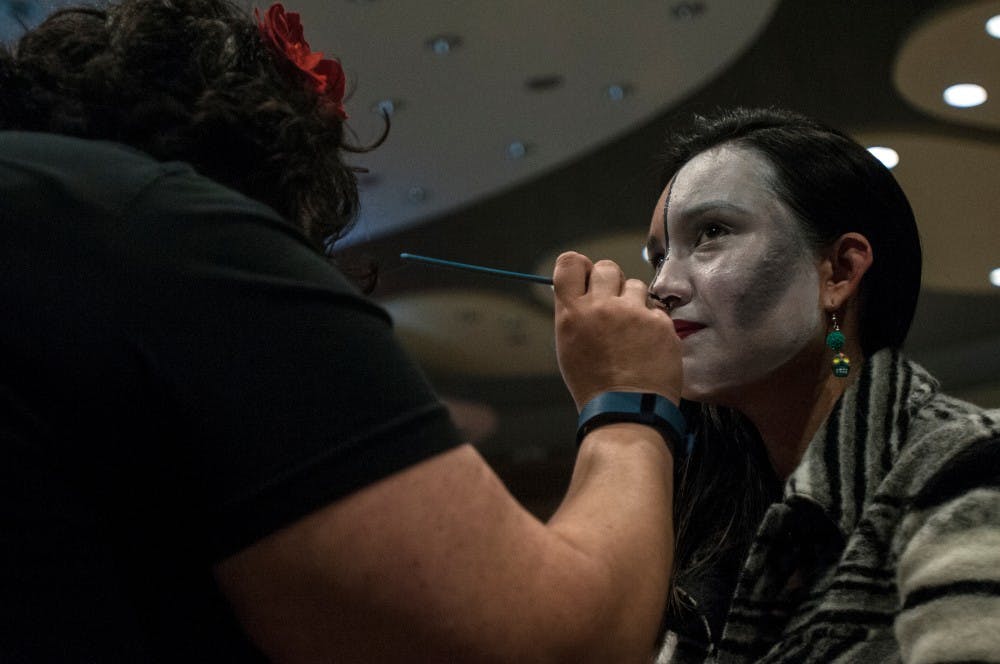While Americans dress up in costumes and trick-or-treat for candy, international students don't celebrate the spooky holiday.
Nursing senior Yixi Dong is from Mianyang, China, and she said when it comes to celebrating Halloween or similar holidays, her hometown doesn’t do much. When she came to the United States, it was one of her first chances to experience Halloween.
“I thought it was interesting, and people went all crazy,” she said. “For the first year, I have gotten (a) chance to celebrate Halloween because I was kind of shy to party at that time.”
Other countries might not exactly celebrate Halloween, but they have somewhat similar holidays. Advertising graduate student Min Young Bae, who is from Seoul, South Korea, said some people do celebrate Halloween in South Korea, just not on the same scale as the U.S.
“Not everyone celebrates, but younger generations dress up and have (parties),” she said. “People doesn't know the tradition or the meaning of Halloween, but consider it as a ‘costume party’ day.”
Halloween is not the only time Koreans have the chance to dress up for a holiday, Bae said. There’s also Seollal, or Lunar New Year’s Day. She said dressing up for this holiday in traditional clothing, or hanbok, used to be a big deal, but isn’t as widely practiced anymore. She said other traditions for this holiday include elders blessing younger generations with money after they are given their due respect.
Sometimes other countries’ holidays fall on or near Halloween. This year the Indian holiday of Diwali was Oct. 30, the day before Halloween, graduate student Rohitha Edara said. She said the holiday is almost always near Halloween.
Edara is the president of the MSU Indian Students Organization. She said Diwali signifies victory of good over evil. Legends centered on the holiday say there was a mighty battle between good and evil. Good won and the victors went home to celebrate with their loved ones, which eventually became what Diwali is today, Edara said.
“We have general rituals where we pray to gods and have lights and fireworks,” she said.
She said it’s hard to follow some of the traditions at MSU. For example, students aren’t allowed to have fireworks, so they have to make do with lights.
There’s also the conflict of time, as it is usually close to Halloween. This year, Edara said students held festivals for Diwali the weekend before, so it wouldn’t conflict with the timing of Halloween.
However, festivals students are able to attend can be a great learning experience. Edara said there’s been approximately 80-90 people at the festivals and a lot of them have been international students.
“They got to learn some Indian dances and eat some Indian food and learn about the culture,” she said.
The following are some of the other Halloween traditions or similar holidays in other countries:
Austria
In Austria, citizens will sometimes leave bread, water and a lighted lamp on a table before going to bed Halloween night. This is done because it was once believed that these items would be welcoming for dead souls coming back to Earth on Halloween, which was considered to be full of strong cosmic energies, according to jackolanterns.net.
England
Children used to make “punkies” out of beetroots that they would carve and design, much like the jack-o’-lanterns of today. They would carry these “punkies” while singing around their different neighborhoods and ask people for money. They would also throw objects like nuts, vegetables and stones at fires to frighten away spirits and to predict the future. Nowadays, the holiday is celebrated in a similar manner to the U.S., according to novareinna.com.
Japan
There is a traditional Buddhist event called Obon to commemorating one’s ancestors. During Obon, ancestors’ spirits return to the world to visit their relatives. Following tradition, Obon dances are performed, lanterns are put out to guide the ancestors’ spirits and graves are visited. Food offerings are also made at temples, according to japan-guide.com.
Support student media!
Please consider donating to The State News and help fund the future of journalism.
Mexico and Latin America
El Dia de los Muertos, or Day of the Dead, originated in Mexico and has spread to other parts of Latin America. Celebrated Nov. 1, the general idea is that mourning the dead will insult them so a joyous celebration is held instead. There is food and drinks, and parties and activities the deceased ancestors once enjoyed are held. The holiday recognizes death as a part of life and on this day the dead are awakened to join in the celebrations of the community, according to National Geographic Society.
Discussion
Share and discuss “MSU International Students celebrate their versions of Halloween” on social media.







